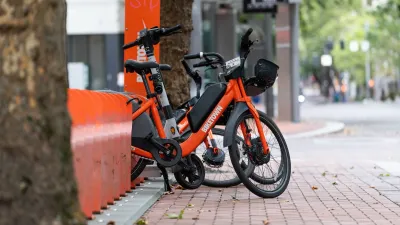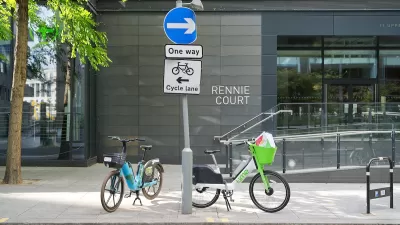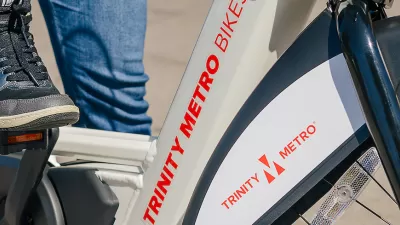Shared mobility is ‘growing up,’ with rental options increasingly expanding to include e-bikes, scooters, and cargo bikes.

Bike share systems in Columbus, Ohio and Washington, D.C. will soon let customers rent cargo bikes, reports Skip Descant in GovTech.
“Columbus’ newest transportation offering is electric cargo bikes provided by Veo, the city’s micromobility operator. The bikes, known as the Apollo Cargo, can carry up to 100 pounds of cargo and will be introduced this month. They include front and rear baskets, throttle-assist motor to eliminate having to pedal, and a cellphone holder with Bluetooth-enabled speakers.” In D.C., CaBi will roll out the same bike model this summer.
According to Paige Miller, Veo’s senior manager for policy and communications, “These cities have laid the groundwork with infrastructure — protected bike lanes, curb management programs, and supportive policies — that make it safe and convenient to ride.” In Columbus, “Interest clearly seems to be trending toward the electrified modes of micromobility. By the end of last year, about one-third of the the city’s bike-share fleet was electric, while the other two-thirds were conventional bikes.”
Expanding the types of bikes and scooters available is a natural extension of shared mobility’s “growing up:” as Descant puts it, “morphing into the kinds of practical vehicles that can haul home a bag of groceries or other items, establishing these devices as essential pieces of urban mobility.”
FULL STORY: In These Capitals, Electric Bike-Share Will Take on Cargo

Planetizen Federal Action Tracker
A weekly monitor of how Trump’s orders and actions are impacting planners and planning in America.

Congressman Proposes Bill to Rename DC Metro “Trump Train”
The Make Autorail Great Again Act would withhold federal funding to the system until the Washington Metropolitan Area Transit Authority (WMATA), rebrands as the Washington Metropolitan Authority for Greater Access (WMAGA).

The Simple Legislative Tool Transforming Vacant Downtowns
In California, Michigan and Georgia, an easy win is bringing dollars — and delight — back to city centers.

Albuquerque’s Microtransit: A Planner’s Answer to Food Access Gaps
New microtransit vans in Albuquerque aim to close food access gaps by linking low-income areas to grocery stores, cutting travel times by 30 percent and offering planners a scalable model for equity-focused transit.

This City Will Pay You to Meet Your Neighbors
A North Kansas City grant program offers up to $400 for residents to throw neighborhood block parties.

Commentary: Our Silence Will Not Protect Us
Keeping our heads down and our language inoffensive is not the right response to the times we’re in. Solidarity and courage is.
Urban Design for Planners 1: Software Tools
This six-course series explores essential urban design concepts using open source software and equips planners with the tools they need to participate fully in the urban design process.
Planning for Universal Design
Learn the tools for implementing Universal Design in planning regulations.
Smith Gee Studio
City of Charlotte
City of Camden Redevelopment Agency
City of Astoria
Transportation Research & Education Center (TREC) at Portland State University
US High Speed Rail Association
City of Camden Redevelopment Agency
Municipality of Princeton (NJ)





























